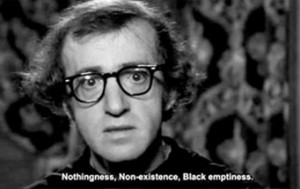 Writing in The Week, Damon Linker wades into the controversy over the comment by Sam Harris that Islam is a “motherlode of bad ideas”. In many respects the controversy is more interesting than the insult, but that’s a discussion for another time. What caught my attention the most in Linker’s article was this:
Writing in The Week, Damon Linker wades into the controversy over the comment by Sam Harris that Islam is a “motherlode of bad ideas”. In many respects the controversy is more interesting than the insult, but that’s a discussion for another time. What caught my attention the most in Linker’s article was this:
Now, I’m no fan of the New Atheists. I think their understanding of religion is shallow and their dismissal of it facile. And then there’s their insouciant attitude toward the prospect of godlessness. As I’ve argued before, the New Atheists prefer sentimental, superficial happy talk to sober reflection on the challenge of living a life without God.
“Sober reflection on the challenge of living a life without God’?
Dear oh dear.
“Challenge?”
That’s a generalization too far.
For some people, living without God may be indeed be a challenge (as Linker rightly points out, it certainly worried old Nietschze), but for others it’s no big deal. They can accept that the sources of morality lie–as they do–in a mixture of genetics and customs, a rough-sewn patchwork that presents some conceptual difficulties, certainly, but only for those inclined to worry about such matters. Most have other things to do with their time.
And yes, some non-believers may indeed be perturbed by the idea of a meaningless universe. But others may prefer it, and others may just not be too bothered.
The answer, I suspect, is that we end up believing in whatever works best for us. And, as Linker suggests, humanity probably does have a bias in favor of the belief in the idea that the universe has some purpose. Why? Well, if I had to guess, there’s an evolutionary reason for that.
That’s an argument that Linker dismisses as “viciously circular” (and no I didn’t see the viciousness either) a rebuttal that moves from the merely lazy to the entertainingly inconclusive:
The prevalence of providential thoughts and feelings might be a response to something real, permanent, and important, if not in the universe itself, then within us.
And the latter probably leads us back to Charlie Darwin, yet again.
Linker, meanwhile:
Settling the matter requires that we listen to what the great religions of the world — including their most intellectually formidable theological representatives — have to say about the character of providence.
It does? Why?

I’m with on you this one, and noticed something I see in lots of comments from defenders of the faiths: Linker refers to the ‘great religions of the world.” What is the definition of a great religion? What distinguishes a great religion from a non-great one?
Narr
I suspect that what is commonly meant is the Big Five Current World Religions: Christianity, Judaism (mainly now because of its family relationship to Christianity), Islam, Hinduism, and Buddhism. Why? Because they’re Big and widespread. Personally, I favor Olympian paganism: the world is run by a committee whose members work at cross-purposes. It fits the facts best.
Olympian paganism–I’m stealing that!
I’m sure you’re right that what is meant by the phrase ‘great religions’ are the large and powerful ones, with violent adherents ready to enforce their notions (to include Judaism in its present status as Western pet, not its historical and traditional one as Western pest).
So Linker’s article has its own ‘vicious circularity.’
Narr
Will no-one #standwithMithras?